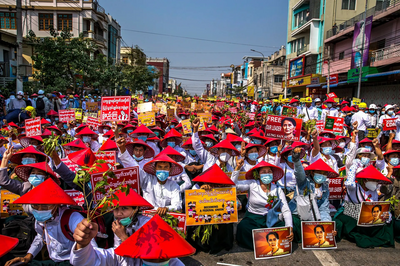Standing with Myanmar – Military rule and the struggle for democracy in Myanmar

History appears to be repeating itself in Myanmar with the military unwilling to relinquish control. Will thousands be killed again, as massive numbers of people nationwide protest in the streets and are engaged in civil disobedience?
Following independence from British colonial rule in 1948, disagreements amongst political elites, the civil wars with ethnic-based groups and anxieties over communist influence led to General Ne Win forming a caretaker government in 1958. An election was held in 1960, but when minority groups pushed for a loose federal structure, which were seen by the military as separatist movements, General Ne Win took over in a coup d'état.
Since then, for the next 30 years, Myanmar was ruled by the military. In 1974, a new Constitution was established and a one-party system was adopted, whereby military officers resigned and governed through the Burma Socialist Programme Party. Protests were held against military rule throughout the 1960s and 1970s, which were crushed, culminating in a major unrest and widespread pro-democracy demonstrations in 1988. Thousands were killed. Martial law was declared in 1989 and Burma was renamed Myanmar.
In May 1990, free elections were held and the National League for Democracy (NLD), led by Aung San Suu Kyi, won 392 out of a total 492 seats (about 80% of the seats). However, the military junta refused to cede power and continued to rule the country. In 2007 a protest led by Buddhist monks was dealt with harshly. Conflicts with regional ethnic groups continued with the Kachin, Shan, Lahu, Karen, Rohingya and ethnic Chinese rebels. In addition, international sanctions also impoverished the country.
In 1997, Myanmar was accepted into ASEAN (Association of Southeast Asian Nations) and took small tentative steps toward reforms. A referendum conducted in 2008 led to a general election in 2010, which was won by the military-backed Union Solidarity and Development Party, claiming 80% of the vote. Further reforms were introduced, including the release of Aung San Suu Kyi from house arrest, amnesties for political prisoners and relaxation of censorship. Ceasefire agreements were also made with 14 out of 17 rebel groups.
In 2015 the NLD won the general election and the first non-military president since 1962 was elected. In November 2020, the NLD won again with an even larger majority. The military responded under the pretext of electoral fraud with another coup, declaring that another election will be held after a state of emergency for one year.
Together with the UN, ASEAN and other international bodies, we urge the military leadership to respect the will of the people of Myanmar, exercise restraint and stop the use of lethal force. Great strides have been made since 2010 in integrating with the global economy and reforming government institutions to better serve the people. The latest February 2021 military coup is a setback to the progress made. We therefore urge the military authority to step back and release NLD members, peaceful protestors and those engaged in civil disobedience.
We stand with and support the people of Myanmar in their non-violent call for the government they elected to be re-instated, for parliament to resume and for elected representatives to fulfil their mandate. We urge the military authority, the NLD and the elected government to start a dialogue to find mutually acceptable solutions. We call on ASEAN, together with the UN, to work towards enabling Myanmar to return to civilian rule. In the meantime, we support the call for an arms embargo to the military in Myanmar.
